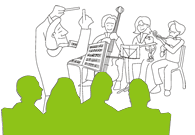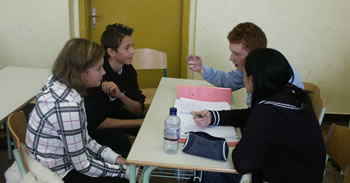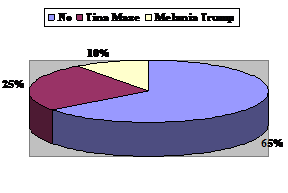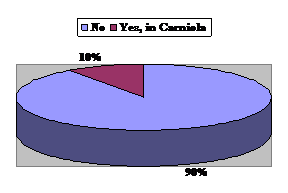 Sprachen-Hauptschule
Birkfeld Sprachen-Hauptschule
Birkfeld
Our exchange day
On Monday, 8.5.2006, we had an exchange day with pupils from
the Sprachen-Hauptschule Birkfeld in Austria. Our task was
to do an interview with them and the analysis of the interview.
The interview was about their past, everyday life (their private
life, home life, nightlife), their plans and prospects on
the future. As they were quite young, we did not get the answers
we expected - their answers were rather »stingy«.
On the other hand some answers were really interesting and
surprising.
We also had a class on the Slovene language. Pupils did not
have specific problems with pronunciation of words like smrt,
cmrlj, etc., but they had some problems with the recognition
of some Slovene dialectal words derived from German (flaša
à die Flasche).
After the Slovene class we went for a snack and afterwards
on some afternoon activities (summer slide, windmill and a
solar house).
We had a great time in Birkfeld, but pupils must be older
- if they were older, we would get more information
about their way of life.
 |
| Slovenian students interviewing their
Austrian counterparts |
|
Knowing Slovenia
1. QUESTION: Do you know any Slovene celebrities?
The majority of pupils do not know any Slovene celebrities,
some know Tina Maze and a few have heard about Melania Trump,
as she is married to a millionaire Donald Trump.
2. QUESTION: Are you familiar with the problems of Slovene
minorities?
90% answered that they know nothing about this problem,
one of them even said that he/she does not know what Slovene
minority is. A few heard something on the television, but
they do not know exactly what it was about.
3. QUESTION: Have you ever been to Slovenia?
Half of the questioned have never been to Slovenia, and
one fourth only drove through it. The others who came visited
Ljubljana and Maribor only. They do not know any other towns
or tourist attractions.
4. QUESTION: Do you learn about Slovenia in school?
25% do not know anything about us, because they have
never learnt anything. The others know something about Yugoslavia
or geography basics and that we are their neighbours. One
student knew that Slovenia became independent in 1991.
To summarize: Students from Birkfeld know very little or
nothing about Slovenes or Slovenia, despite the fact that
we are their neighbours. They do not learn about the history
or geography of Slovenia and are not familiar with problems
between the two countries. We are disappointed with their
knowledge and think that they should get more information
about Slovenia in school.
1. Do you know any Slovene celebrities?

2. Are you familiar with the problems of Slovene minorities?

Lifestyle of Austrian pupils
We wanted to find out some things about where the Austrian
pupils lived, how important the place of living was for them
f and if the number of children per family was the same as
around the Europe.
Concerning the place of living, we expected, as Birkfeld
is quite small town that people will live in houses or on
small farms. Our expectations were true, because all of them
live in a house and they said that all their friends and relatives
live in a house, too. 11 people have added how far/near the
school they live and only 1 of them lives far from school,
the others live in Birkfeld or in a village Haslau, which
is 4 km from Birkfeld. We expected that more people will live
outside the city, because the headmaster said to us that some
students, who visit this school, have to wake up around 5
o"clock so that they can arrive to school on time.
We wanted to find out if material status is important for
them. We assumed that the more the material status is important
to them, the more details they will tell and give us about
their house. At first three speakers gave us detailed information
about their houses. The first speaker said that he lived in
a very big house with big windows and big doors and that their
house was divided into two parts. We assume that for this
person material things are quite important. The other speaker
told us less, but it seemed, that for him a homely and comfortable
house is of great importance, even if it is smaller. The third
speaker likes his house, even though he thinks that it is
nothing special, but it is near the road. The rest of the
questioned did not tell much about their houses, some of them
just said that they were big (all speakers said that) and
what colours they were (yellow, white). Because of this information
we think that the size of the house is quite important for
people in Birkfeld and that the appearance is very important.
Almost half of them added that they have some land around
the house; they have plants, grass, gardens or even forests
around their houses. Therefore we assume that that the appearance
plays an important role and we got the impression that nature
is quite important for them, eventually we expected that,
because they live in a quite small settlement which is surrounded
by nature and hills.
As to the size of their families we wanted to find out if
they have big families or not and how big an average family
in Birkfeld was. All of them have at least one sibling; more
of them have a brother. There are quite a lot of families
with 3 children (80 % of them), in one family there were 5
children and one speaker told us that the only people she
knows with more than 3 children are her neighbours, who have
5 children. From the declining birth rates in Austria we expected
that there will be no big families. And because of that, we
can say that we were a bit surprised when we heard that there
were families with 3 children and sometimes with more than
3 children, too.
To sum up we think that the way of living of Austrians is
very similar to ours and that there are no such big differences
between the two countries.
Pocket money
Austrian pupils all get pocket money, and they feel happy
about it. The amount is from 7 - 40€ per month. The average
is 16 €. With the exception of one they all think it
is enough.
Most of them spend it on sweets, CDs, drinks, clothes, food,
etc. Some (3) are saving it for a motorbike and has a bank
deposit.
Nightlife
The results about the pupils" nightlife were predictable
because of their age. In Austria it is illegal for teenagers
under 16 to get alcohol, so our prediction was that they do
not get anything to drink in pubs.
Half of the students do not go out because they consider
themselves too young or their parents do not allow them. The
other half said that they are allowed to stay out and hang
out with friends. If they go out, they usually go to the cinema,
disco or to a local pub. But they do not drink any alcohol
because they are under 16. Almost all pupils can stay out
until 11 o'clock. But we can find some exceptions, some can
stay out until 2 a.m.
These results tell us that people in Austria obey the law
(especially law concerning alcohol) more that people in Slovenia
(in Slovenia teenagers under 18 can get alcohol quite easily).
We can also see that they do not do illegal things when they
are out or they just do not want to admit it. Now we can say
a word about places they go to. They go out like we do, usually
to the cinema, pubs or they just hang around in the city centre.
Most of them said that they really like to go in their »famous«
disco, which they praised so much and said that party starts
after 11 o'clock (Please note their staying out time). Here
we can see some big contrasts. In the end of our analyse we
have to stress that answers from pupils were not so honest
as we thought they were. Maybe because they do not want to
talk about illegal things or they were just trying to look
cool in front of us elders. But we still believe that they
are just nice, hardworking, obedient and communicative Austrian
teenagers.
Smoking and taking drugs
The questions about alcohol, cigarettes and drug problems
in the area also met our expectations. As the interviewees
were of age 14, we assumed that they do not drink nor smoke.
On their school smoking is not aloud, so some pupils smoke
only at weekends when they go out. Most of them do not smoke
at all. In Austria alcohol is illegal for young people under
16 years, so we assumed pupils do not drink. Most of the pupils
told us that they do not drink. Although there were some exceptions,
some pupils do drink but only at weekends when they go out.
The next thing we were interested in were drug related problems.
Most of the pupils were sure that there were no drug related
problems in their area. Some of them, however, believed that
marihuana represents a problem. We were satisfied when we
realised that some pupils do know that alcohol and cigarettes
are drugs and they said that this is a drug related problem
in their area.
Regarding the situation in Slovenia we believe that they
are more tolerant towards drugs, as we know alcohol and cigarettes
are also a drug. If we made a research in Slovenia, we would
find out a higher percentage of pupils who smoke and drink.
But in this statement we have to look at the age and also
the law, which is different in both countries. Our country
has stricter laws that nobody obeys, but in Austria pupils
can buy alcohol earlier so they do not hide at in a park at
the age of 16. We think that this is a good solution to the
problem, because there are less pupils who drink alcohol and
those who can are more tolerant because they do not do anything
illegal.
Future plans
We wanted to find out something about the future plans of
the Austrian pupils, how they see life and which things are
valuable to them. The most important things for the students
are their family, friends and school. We could say that this
is not surprising, as they are of great importance for almost
every adolescent. As to the future plans, the most of them
were speaking about a job and education, so we can conclude
that in the future they want to get financial security or
good education, which is characteristic of the modern European
society.
Therefore most of them will continue with education; only
some of them want to get a job and be a mechanic or a builder
etc. We can conclude that the Austrian pupils share our expectations
and plans for the future. |